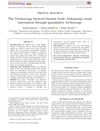TLDR Finasteride and dutasteride are effective in treating male hair loss but can cause sexual side effects and birth defects.
The document evaluates the effectiveness of 5 alpha reductase inhibitors (5ARIs), specifically finasteride and dutasteride, in treating male androgenic alopecia (AGA), a hair-loss disorder. Finasteride, approved by the FDA in 1997, reduces scalp and serum dihydrotestosterone (DHT) by 64% and 68% respectively, halting AGA in at least 90% of men and promoting hair regrowth in 48% at 12 months and 66% at 48 months. However, it can cause reduced libido and erectile dysfunction. Dutasteride, more potent than finasteride, decreases DHT more significantly but has a higher risk of sexual side effects. Both drugs can cause birth defects and are not recommended during pregnancy. The authors suggest 5ARIs for early and long-term use to prevent baldness, but discontinuation leads to loss of effect and return to baseline hair density at 6 months.
1 citations
,
August 2022 in “Journal of Dermatological Treatment” Dutasteride is the most effective for hair loss but may cause sexual and mental side effects.
Mesotherapy with dutasteride effectively treats hair loss with manageable side effects.
11 citations
,
October 2021 in “Journal of The European Academy of Dermatology and Venereology” Topical finasteride is an effective and safer treatment for male hair loss.
 6 citations
,
December 2018 in “Australasian Journal of Dermatology”
6 citations
,
December 2018 in “Australasian Journal of Dermatology” The Trichoscopy Derived Sinclair Scale offers a more accurate and reliable way to measure hair loss severity than the traditional visual method.
 50 citations
,
March 2017 in “PeerJ”
50 citations
,
March 2017 in “PeerJ” Using finasteride or dutasteride may cause long-lasting erectile dysfunction.
 17 citations
,
June 2012 in “Australasian Journal of Dermatology”
17 citations
,
June 2012 in “Australasian Journal of Dermatology” Finasteride and low-dose dutasteride combo improves hair growth and reduces hair loss with no major side effects.
 40 citations
,
May 2010 in “Australasian Journal of Dermatology”
40 citations
,
May 2010 in “Australasian Journal of Dermatology” Chronic hair shedding may be caused by less variation in hair growth times and might stop on its own after several years.
 116 citations
,
September 2001 in “Journal of The American Academy of Dermatology”
116 citations
,
September 2001 in “Journal of The American Academy of Dermatology” Hair loss occurs due to fewer papillary cells, smaller follicles, and shorter growth phases.
 179 citations
,
September 1998 in “BMJ”
179 citations
,
September 1998 in “BMJ” Hair loss in men is common, treatable, but not curable.
1 citations
,
June 2021 in “Singapore Medical Journal” Dutasteride and finasteride can help increase hair growth gene expression but need further improvement.
 19 citations
,
April 2020 in “Dermatologic Therapy”
19 citations
,
April 2020 in “Dermatologic Therapy” Dutasteride works better than finasteride for hair loss, with both being safe to use.
 January 2018 in “Surgical and Cosmetic Dermatology”
January 2018 in “Surgical and Cosmetic Dermatology” 5-alpha reductase inhibitors like finasteride and dutasteride are effective for treating enlarged prostate and male pattern hair loss.
8 citations
,
January 2016 in “Indian Journal of Pharmacology” Finasteride and dutasteride can cause severe, lasting side effects.
47 citations
,
January 2003 in “Current opinion in urology” A new drug, dutasteride, is at least as effective as the older drug, finasteride, for treating enlarged prostate and may have additional uses.








